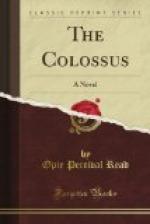“But slavery was swept away—and, let me affirm,” he suddenly broke off, “that the condition of the poorer people in this town is worse than the slavery that existed in the South. From that slavery the government pointed toward freedom, and mill-owners in the North applauded—men, too, mind you, who were the hardest of masters. I can bring up now the picture of a green lane. I can see an old negro woman sweeping the door-yard of her cabin, and she sings a song. Her husband is at work in the field, and her happy children are fishing in the bayou. That is the freedom which the government pointed out—the freedom which a God-inspired Lincoln proclaimed. But do you hear any glad songs among the slaves in the North? Let me tell you, sir, that we are confronted with a problem that is more serious than that which was solved by Lincoln.”
Witherspoon looked at him as though he could think of no reply. At one moment he seemed to be filling up with the gathering impulses of anger; at another he appeared to be humiliated.
“Are you my son?” he asked.
“Presumably. An impostor would yield to your demands; he would win your confidence that he might steal your money.”
“Yes,” said the merchant, and he sat in silence.
Henry was the first to speak. “If you were poor, and with the same intelligence you have now, what would you advise the poor man to do?”
“I should advise him to do as I did when I was poor and as I do now—work. Now, let me tell you something: Last year your mother and I gave away a great deal of money—we do so every year. Does that look as if I am grinding the poor? You have hurt me.”
“I am sorry. But if I have hurt you with a truth, it should make you think.”
Witherspoon looked at him, and this time it was with resentment. “What! you talk about making me think? Young man, you don’t know what it is to think. You are confounded with the difference between sentimentalism and thought. You go ahead and print your newspaper and don’t worry about the workingwoman. Her class will be larger and worse off, probably, a hundred years after you are dead.”
“Yes, but before that time her class may rise up and sweep everything before it. A democracy can’t long permit a few men to hold all the wealth. But there’s no good to come from a discussion with you.”
“You are right,” said Witherspoon, “but hold on a moment. Don’t go away believing that I have no sympathy for the poor. I have, but I haven’t time to worry with it. There is no reason why any man should be poor in this country.”
Henry thought of a hundred things to say, but said nothing. He knew that it was useless; he knew that this man’s strength had blinded him to the weakness of other men, and he felt that American aristocracy was the most grinding of all aristocracies, for the reason that a man’s failure to reach its grade was attributable to himself alone.




